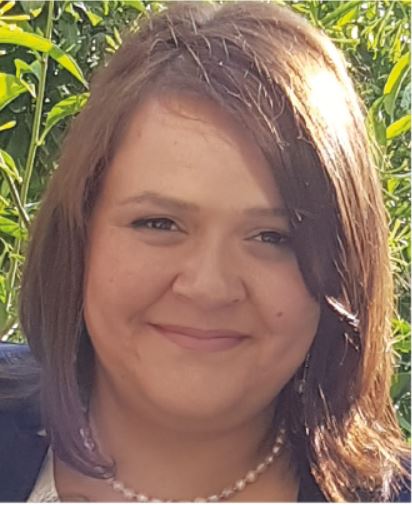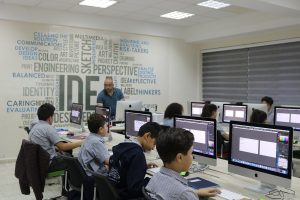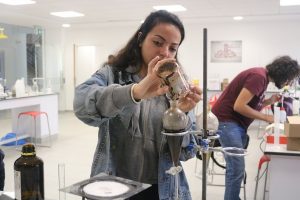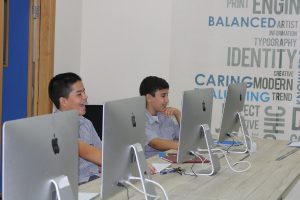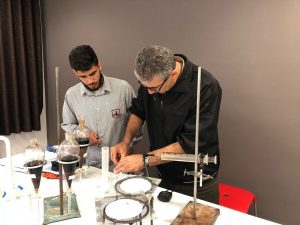We often perceive teachers as amazing heroes with incredible superpowers. So we talk to them like that, we expect them to reach to the stars and land on the moon. We want them to be our children’s moral compass and do the parenting instead of us. We have such high expectations of them, almost unrealistic in magnitude, but we often treat them with little respect.
At the first sight of exhaustion, at the first sight of a mistake, we turn on them and come down so hard that we often dismiss their humanity. And by we, I mean all of us: students, administrators, and parents. The universality of the statements may suggest a generalization, but if we take these statements and use them as lenses to examine teachers in Palestine, we find them to be painfully true.
While the image of a superhero is one that any of us takes pride in, it is exactly this image, the endless hours and the incredible amount of effort that goes into teaching someone else’s children that makes teaching and teachers suffer.
In order for this conversation to go well, we should agree on specific assumptions. First, we agree that education is all about the students, and that student achievement and growth are what we all strive for as educators. To sound even more romantic, I would say that we are all here to raise the next generation in the hope of a better Palestine. So all discussions about learning, including this article, are based on this assumption. I believe, however, that in our discussion and focus on student-centered learning and what needs to go on in the classroom, we may have, ever so slightly, forgotten about the dynamos that make the wheels turn, the teachers.
Second, we must agree that our first take on teaching, no matter how many education degrees we hold, is a mirror image of how we were taught. The first inclination we all have is to stand at the front of the class and throw information at students like a bag of jelly beans, expect them to catch it all, then automatically remember it the following day. If you are a teacher, you know exactly what I am talking about. The first time you stood in front of a class was some version of what I just described.
As we learn on the job, we may slowly venture out of the front-of-the-class zone and attempt worksheets, or a video here and there, but many of us will retreat back at the first sign of defeat when one meticulously planned lesson does not work or an exercise isn’t met with the expected response. We worry that if we try something new, we are somehow cheating our children out of a genuine learning experience.
In order to allow teachers to grow into facilitators, like many of us in Palestine aspire to do, the first task is to enable them to learn on the job. What if we treated our teachers like doctors? Every now and then I receive unhappy parents in my office who think that the school is using their children as lab rats, experimenting with new curricula and novel approaches. The conversation dips into a parental tirade that ebbs and flows and then ends as abruptly as it started. What is the problem with experimentation? If surgeons can learn surgery by operating on patients, why can’t teachers learn to teach by teaching? It also wouldn’t hurt to pay teachers as much as we pay surgeons, but that is another story for a different time and place.
Around this time of the year, we receive numerous students from various universities looking to intern with us for a week or two. This includes class observations, overall school observations, and maybe one or two meetings with the subject teacher. The school has no say in what these interns do, and they are here for such a short period of time that we barely get to know them. There is little to no follow up on them from the university, and the sheet we receive to sign asks nothing about their performance but rather is focused on the number of hours they completed.
In teaching, as in medicine, observation is necessary in order to learn, but as in medicine, doing is even more important. How else will a surgeon learn the exact amount of pressure to apply to a ten blade to make an incision across the abdomen? It is a fact that the more you practice, the better your technique becomes. You develop a sixth sense in your profession; you are almost able to predict a problem from observation before it even happens. Teaching is no different. The more time you spend in the classroom, the more you try things out, the sharper your sense of teaching becomes. You can almost predict how your students will react to a certain project or topic.
So if we create a systematic interning program, where teachers are given a year’s worth of pedagogical training, the latest in approaches to learning and teaching, and an opportunity to teach under the close supervision of their “attending teacher,” we may minimize teacher burnout and maximize growth and development, which ultimately affects student academic progress.
Learning and teaching are experiential. Without trying a new approach, how will we become better teachers?
Teachers strive to be perfect, and because we perceive them to be superheroes, we expect nothing less than perfection. But in teaching it is not perfection we are after, it is a process and a journey of growth. And if we adapt a growth mindset, we can then allow our teachers to experiment and turn their classrooms into learning labs. This will enable them to uncover their students’ talents, their challenges, and to not shy away from thinking outside the box. Palestine isn’t devoid of good teachers, but we are certainly far from allowing those teachers to experiment and innovate.
As exciting as it is to see so many innovation incubators and start-up funders pop up, what we really need is an innovative approach to teacher training, a medical-school-style intern year where interns do the scud work and learn all the tricks of the trade in the process.
Innovation is iterative; the first version of anything almost never works. The versions that follow get better with time, data collection, and a chance to go back to the drawing board every time. This is possible for all professions; even surgeons can make mistakes, but for some reason we don’t offer teachers the same indulgence. We simply want them to be perfect, and no human is ever perfect.
Article photos show students and teachers from (Upper) Ramallah Friends School engaged in exploration and learning. Courtesy of RFS.

